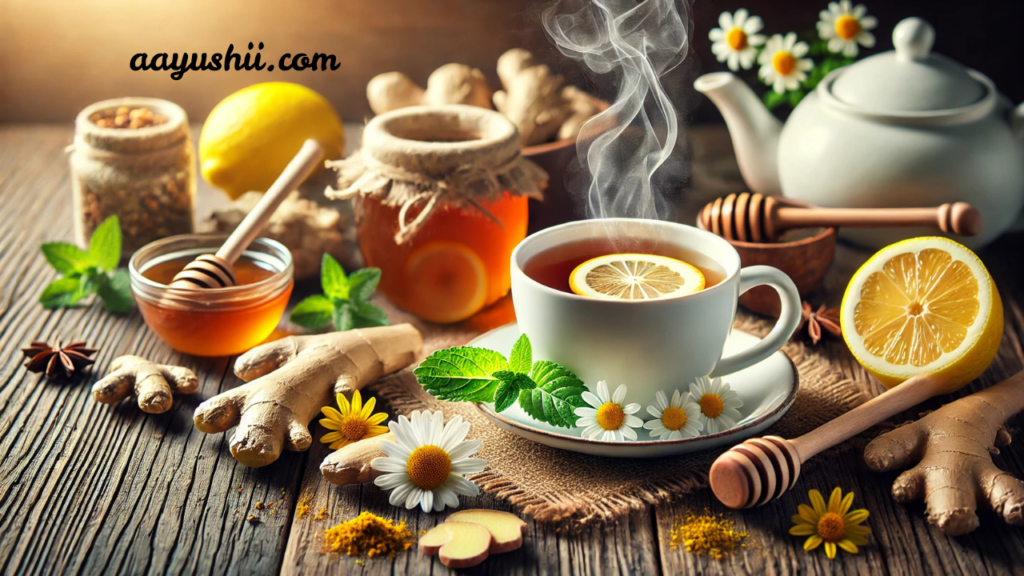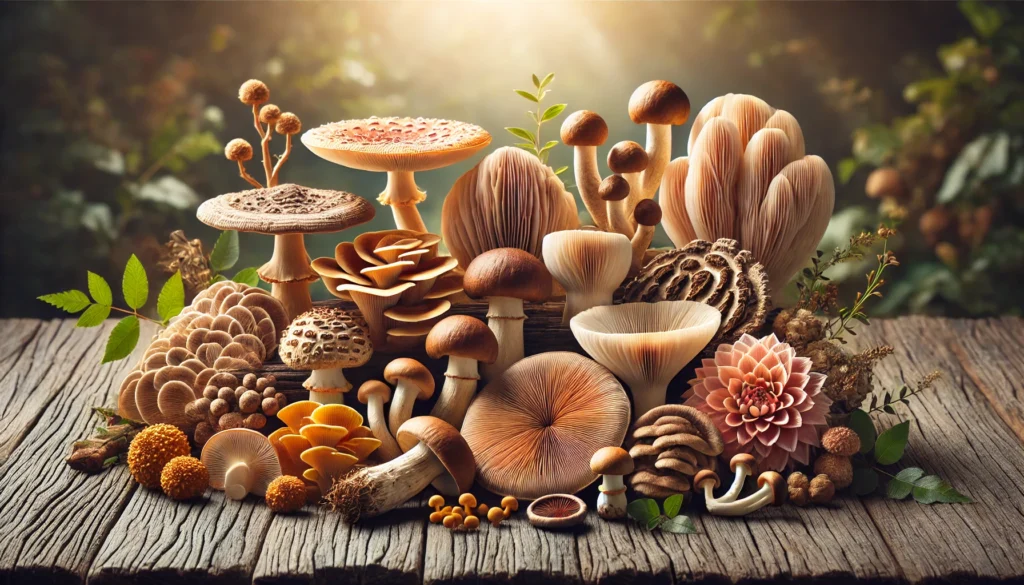For centuries, herbal teas have been a cornerstone of traditional medicine, celebrated for their soothing warmth and remarkable healing properties. Whether you’re looking to ward off seasonal colds, recover from an illness, or enhance your overall well-being, these natural brews offer a gentle yet powerful way to support your immune system.
In today’s world, more people are turning to nature’s remedies to strengthen their body’s defenses. Herbal teas can help reduce inflammation, combat oxidative stress, and promote overall health—all essential for a resilient immune system. Plus, the simple ritual of sipping a warm, fragrant cup of tea can be a moment of self-care, easing stress and fostering relaxation.
This comprehensive guide will take you through everything you need to know about immune-boosting herbal teas. You’ll discover how they enhance immunity, the best ways to brew them for maximum effectiveness, and essential precautions to consider. By the end, you’ll have all the knowledge you need to incorporate these powerful teas into your daily routine and fortify your health naturally.
Understanding Immunity and Its Importance

Before diving into specific herbal teas, it’s important to understand how immunity works and why it’s crucial for overall health. Your immune system is your body’s natural defense mechanism, protecting you from harmful invaders like bacteria, viruses, fungi, and parasites. A well-functioning immune system not only prevents infections but also helps you recover faster when you do get sick.
Key Components of the Immune System

- Innate Immunity (First Line of Defense)
- This is your body’s immediate response to foreign invaders.
- It includes physical barriers like skin, mucous membranes, and stomach acid, which prevent pathogens from entering the body.
- Cells like white blood cells (phagocytes, natural killer cells) patrol your body, attacking any harmful invaders they come across.
- Works quickly but non-specifically, meaning it fights off all invaders the same way, without remembering them for the future.
- Adaptive Immunity (Learned Defense)
- This is a more specialized, long-term immune response that develops as your body learns from past infections or vaccinations.
- It includes B cells and T cells, which recognize and remember specific pathogens.
- When exposed to a virus or bacteria again, your adaptive immune system mounts a stronger and faster response, preventing reinfection.
- This is the reason why vaccines work—they help your immune system recognize and fight specific threats effectively.
Factors That Affect Immunity
- Diet: Nutrient deficiencies can weaken immune response.
- Sleep: Lack of quality sleep disrupts immune regulation.
- Stress: Chronic stress elevates cortisol levels, weakening the immune system.
- Lifestyle: Smoking, excessive alcohol intake, and sedentary living impair immune function.
Herbal teas often address multiple aspects of immunity: they can help reduce inflammation, offer antioxidants to combat oxidative stress, and sometimes even calm the mind, thereby lowering stress levels. By keeping these foundational elements in balance, you give your immune system the support it needs to function at its best.
How Herbal Teas Support the Immune System
The immune-boosting power of herbal teas comes primarily from the bioactive compounds found in the leaves, roots, seeds, or flowers of medicinal plants. These bioactive compounds include:
- Antioxidants (like polyphenols, flavonoids, catechins): Combat free radicals and reduce oxidative stress in the body.
- Anti-inflammatory Agents (like gingerols in ginger, curcumin in turmeric): Help modulate the inflammatory response.
- Essential Oils (like menthol in peppermint): Can soothe irritated membranes and support respiratory health.
- Vitamins and Minerals (found in herbs like rosehips, nettle, and hibiscus): Provide nutrients essential for immune function.
- Adaptogenic Properties (in herbs like tulsi or ashwagandha): Support the body’s ability to handle stress, helping maintain hormonal balance and overall resilience.
Each herb offers its own unique therapeutic profile, making it valuable to include a variety of herbal teas in your routine. In the following sections, we’ll explore a range of potent herbal teas—from household favorites like ginger and chamomile to lesser-known wonders like tulsi and lemon balm.
Top Immunity-Boosting Herbal Teas
1. Ginger Tea
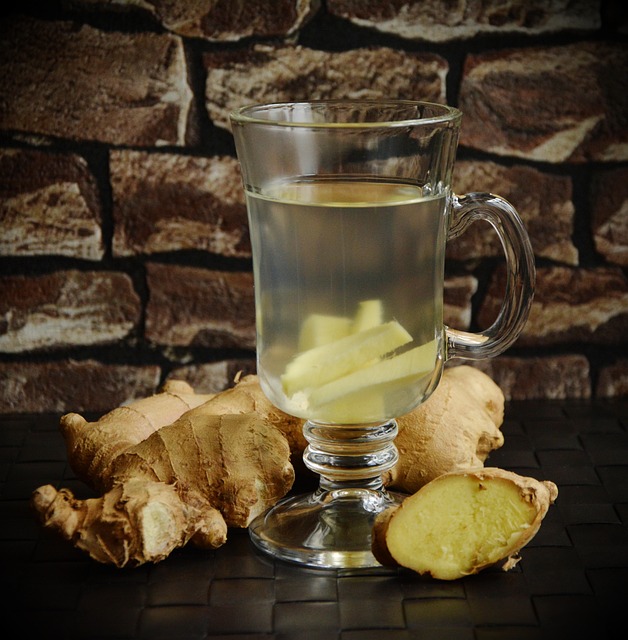
Ginger (Zingiber officinale) has long been hailed for its warming, stimulating properties and is a popular choice when looking to support immune function.
Key Benefits
- Anti-inflammatory: The active compounds in ginger, known as gingerols and shogaols, help reduce inflammation and support a healthy immune response.
- Digestive Aid: Ginger can soothe an upset stomach, reduce bloating, and improve digestion, indirectly aiding overall health and nutrient absorption.
- Antioxidant Effects: Ginger’s antioxidants help neutralize free radicals, offering an extra layer of cellular protection.
- Respiratory Support: The warming effect of ginger can help clear congestion and ease respiratory discomfort.
How to Brew
- Slice fresh ginger root into thin pieces (about 1–2 inches of ginger).
- Bring 2 cups of water to a rolling boil.
- Add the ginger slices and simmer for 10–15 minutes. The longer you simmer, the stronger the tea.
- Strain the tea into a mug and add lemon or honey if desired for additional immunity benefits and flavor.
Usage Tips
- Drink 1–2 cups per day to harness the immune-supporting properties.
- Combine ginger with turmeric for a powerful anti-inflammatory blend.
2. Chamomile Tea
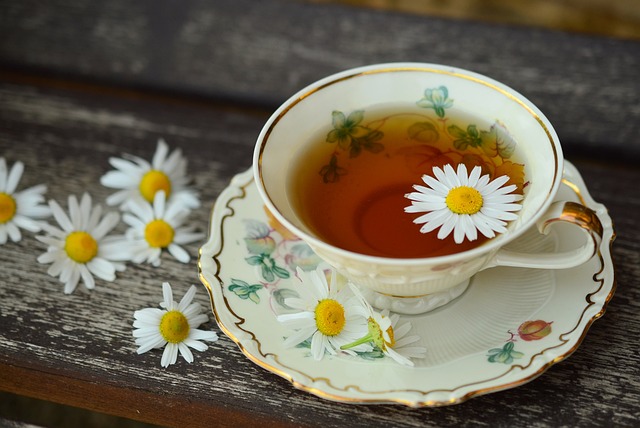
Chamomile (Matricaria chamomilla or Chamaemelum nobile) is best known for its calming and soothing properties. But it also offers supportive benefits for immune function.
Key Benefits
- Stress Reduction: Chamomile is renowned for its ability to promote relaxation and better sleep, which are vital for strong immune health.
- Anti-inflammatory Compounds: Chamomile contains terpenoids and flavonoids like apigenin, which can help reduce inflammation.
- Digestive Comfort: Drinking chamomile tea can soothe an upset stomach, promoting optimal digestion and nutrient uptake.
How to Brew
- Use 1 tablespoon of dried chamomile flowers (or a chamomile teabag).
- Steep in 8 ounces of hot water (around 200°F/93°C) for about 5 minutes.
- Strain if using loose chamomile and enjoy warm.
Usage Tips
- Ideal as a nighttime tea to help unwind and improve sleep quality.
- You can pair chamomile with lavender or lemon balm for enhanced calming effects.
3. Echinacea Tea

A staple in traditional Native American remedies, Echinacea (Echinacea purpurea) is widely studied for its immune-modulating properties.
Key Benefits
- Immune System Activator: Echinacea is thought to stimulate white blood cells, helping the body to better fight infections.
- Upper Respiratory Support: Often used to shorten the duration of colds and flu.
- Rich in Polysaccharides: These compounds support the body’s innate immune responses.
How to Brew
- Use 1 teaspoon of dried echinacea per 8 ounces of water.
- Steep in hot water (212°F/100°C) for 10–15 minutes to extract its medicinal properties.
- Strain and drink while warm.
Usage Tips
- Consult a healthcare professional if you have autoimmune disorders or are on immunosuppressants, as echinacea might not be suitable for everyone.
- Best used short-term, particularly at the onset of cold or flu symptoms.
4. Elderberry Tea
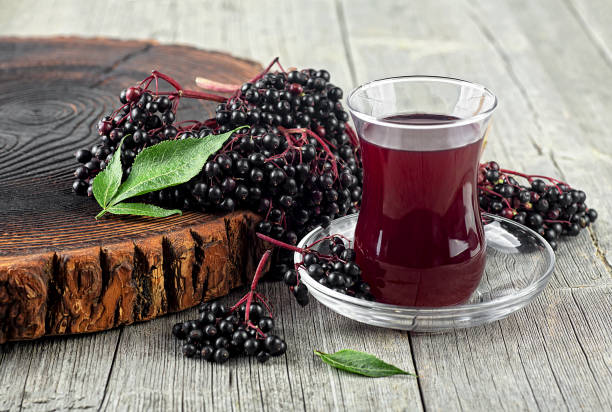
Elderberry (Sambucus nigra) is a popular go-to herb for immune support, especially during cold and flu season.
Key Benefits
- Antiviral Compounds: Elderberries contain anthocyanins, believed to inhibit viral replication.
- Antioxidant-Rich: High levels of flavonoids support the body’s defense against oxidative stress.
- Respiratory Support: Commonly used to relieve congestion and other upper respiratory symptoms.
How to Brew
- Use 1 tablespoon of dried elderberries per 1 cup of water.
- Boil the mixture for about 10–15 minutes to ensure safety and adequate extraction.
- Strain thoroughly to remove berries and any small particles.
Usage Tips
- Never eat raw elderberries, as they can be toxic. Always cook or boil them to remove harmful compounds.
- Consider combining elderberry with rosehips or hibiscus for a vitamin C boost.
5. Peppermint Tea
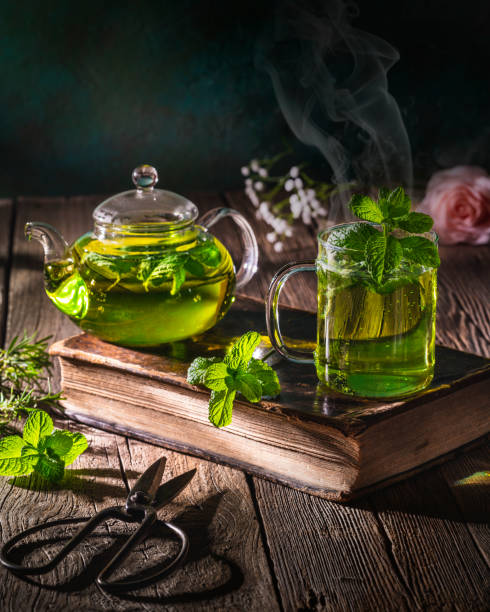
Peppermint (Mentha × piperita) is well-loved for its refreshing taste and cooling sensation, but it also carries benefits that can support immune health.
Key Benefits
- Respiratory Relief: Peppermint’s menthol content can help clear sinuses and soothe breathing.
- Digestive Comfort: It’s excellent for relieving bloating, gas, and indigestion.
- Antibacterial Properties: Peppermint exhibits mild antibacterial effects, helping support healthy gut flora.
How to Brew
- Use 1 tablespoon of fresh peppermint leaves or 1 teaspoon of dried peppermint.
- Steep in hot water (around 200°F/93°C) for 5–7 minutes.
- Strain and serve hot or cold, depending on preference.
Usage Tips
- Peppermint can be enjoyed any time of day, but it’s especially refreshing after meals to aid digestion.
- Pair with lemon balm or chamomile for a soothing bedtime blend.
6. Turmeric Tea
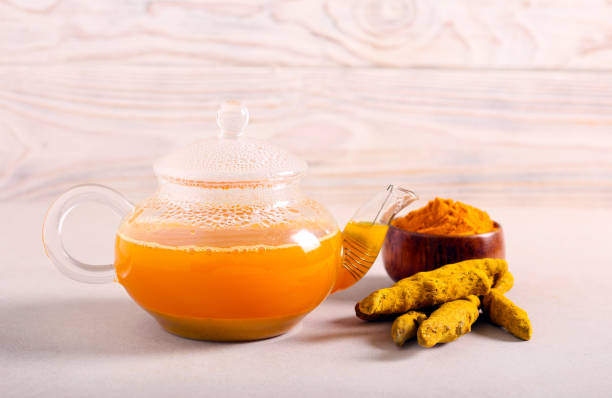
Turmeric (Curcuma longa), often called the “golden spice,” is revered for its potent anti-inflammatory and antioxidant properties.
Key Benefits
- Curcumin Power: Curcumin is the primary active compound in turmeric, known to reduce inflammation and support immune regulation.
- Antioxidant Defense: Turmeric can help combat oxidative stress, protecting cells from damage.
- Joint and Muscle Support: Often used to alleviate joint discomfort and muscle aches, supporting overall mobility.
How to Brew
- Use 1 teaspoon of powdered turmeric or a 1-inch piece of fresh turmeric root (grated).
- Simmer in 8–10 ounces of water for 5–10 minutes.
- Enhance absorption by adding a pinch of black pepper, as piperine aids curcumin absorption.
- Optionally add coconut milk or almond milk and a sweetener like honey or maple syrup for a creamy golden latte.
Usage Tips
- Turmeric stains easily; handle it with care to avoid discoloration of countertops and utensils.
- Combine ginger and turmeric for a double anti-inflammatory boost.
7. Holy Basil (Tulsi) Tea
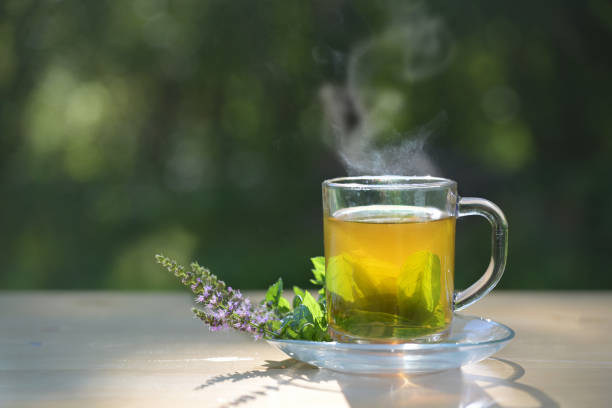
Holy Basil, also known as Tulsi, is a revered herb in Ayurvedic tradition known for its adaptogenic and immune-supporting properties.
Key Benefits
- Adaptogenic Herb: Helps the body adapt to stress by balancing cortisol levels.
- Respiratory Health: May aid in clearing congestion and improving lung function.
- Antioxidants: Rich in polyphenols that protect against oxidative damage.
How to Brew
- Use 1 teaspoon of dried tulsi leaves or 1 tablespoon of fresh leaves per 8 ounces of water.
- Steep in hot water (around 200°F/93°C) for 5–10 minutes.
- Strain and enjoy warm.
Usage Tips
- Known as the “Queen of Herbs” in Ayurveda, tulsi is often consumed daily for general wellness and stress management.
- Pair tulsi with ginger or peppermint for a revitalizing morning blend.
8. Lemon Balm Tea
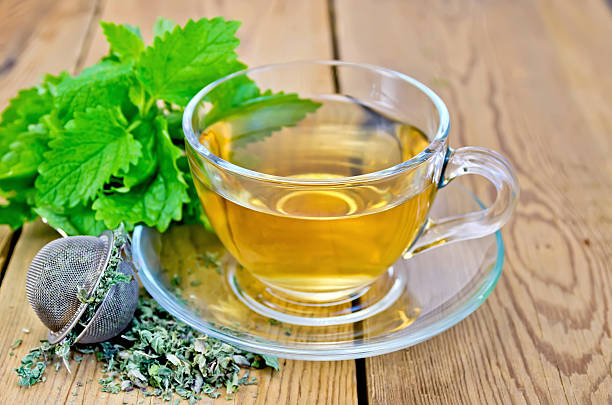
Lemon Balm (Melissa officinalis) has a bright, citrusy aroma and a reputation for calming the nervous system.
Key Benefits
- Calming Effects: Lemon balm can help reduce stress and anxiety, indirectly supporting immune health by improving sleep and relaxation.
- Antioxidant Properties: Contains rosmarinic acid, which has been shown to have antioxidant benefits.
- Antiviral Potential: Preliminary studies suggest lemon balm may help inhibit certain viruses, making it a useful herb during cold and flu seasons.
How to Brew
- Use 1–2 teaspoons of dried lemon balm or a small handful of fresh leaves.
- Steep in hot water (around 200°F/93°C) for 5–8 minutes.
- Strain and enjoy. The flavor pairs well with honey or stevia.
Usage Tips
- Often combined with chamomile or lavender for a relaxing, sleep-promoting blend.
- Safe for most individuals, but check with a healthcare provider if you’re on thyroid medications, as lemon balm can potentially interfere with thyroid function.
9. Rooibos Tea
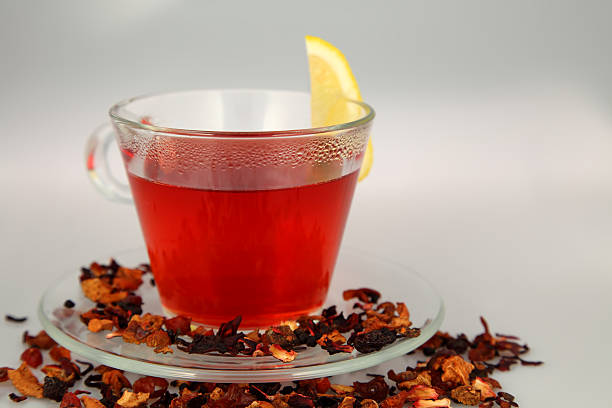
Rooibos (Aspalathus linearis), native to South Africa, is a caffeine-free alternative that boasts a mild, naturally sweet flavor.
Key Benefits
- High in Antioxidants: Rich in aspalathin and quercetin, which can neutralize free radicals and support healthy immune function.
- Anti-inflammatory: May help reduce inflammation, supporting overall wellness.
- Promotes Heart Health: Some studies suggest that rooibos might help manage blood pressure and cholesterol levels, indirectly benefiting general health.
How to Brew
- Use 1 teaspoon of rooibos leaves (or a teabag) per 8 ounces of water.
- Steep in boiling water for 5–7 minutes. Rooibos doesn’t turn bitter as quickly as green or black tea, so you can steep longer for a stronger flavor.
- Strain and enjoy hot or iced.
Usage Tips
- Because it’s caffeine-free, rooibos is an excellent option for evenings or those sensitive to caffeine.
- Pairs well with vanilla or cinnamon for a dessert-like treat.
10. Hibiscus Tea
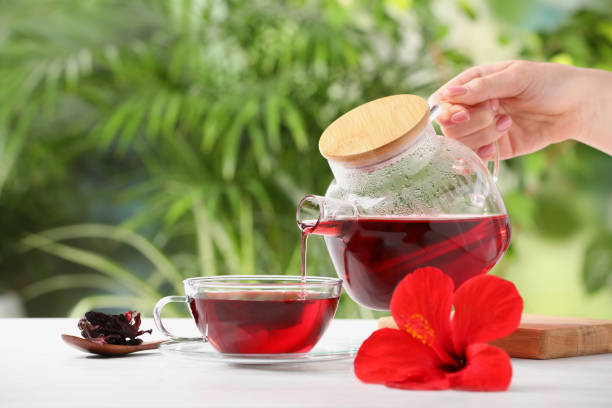
Hibiscus (Hibiscus sabdariffa) produces a vivid ruby-red infusion with a tart, cranberry-like flavor.
Key Benefits
- Rich in Vitamin C: Vitamin C is crucial for immune health, aiding white blood cell function and collagen synthesis.
- Antioxidant-Dense: Contains anthocyanins that help protect against oxidative stress.
- Blood Pressure Support: Studies show hibiscus tea can help support healthy blood pressure levels.
How to Brew
- Use 1 tablespoon of dried hibiscus flowers per 8 ounces of water.
- Steep in hot water (212°F/100°C) for 5–10 minutes. Longer steeping intensifies the tartness.
- Strain and sweeten with honey or fruit juice if desired.
Usage Tips
- Hibiscus can be quite tart. To balance the flavor, consider adding a natural sweetener like honey or blending with rosehips or mint.
- If you have low blood pressure or are taking medication for blood pressure, consult a healthcare provider before regular intake.
11. Rosehip Tea
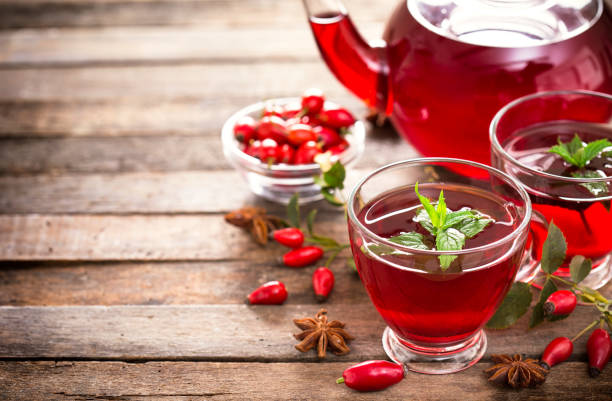
Rosehips are the fruit of the rose plant, typically high in Vitamin C and other antioxidants.
Key Benefits
- Vitamin C Superstar: Rosehips contain one of the highest plant-based levels of vitamin C, an essential nutrient for immune function.
- Collagen Support: Vitamin C is required for collagen production, supporting skin, joints, and blood vessel health.
- Anti-inflammatory and Antioxidant: Various bioactive compounds help fight inflammation and oxidative stress.
How to Brew
- Use 1 tablespoon of dried, crushed rosehips per 8 ounces of water.
- Steep in hot water for about 10–15 minutes.
- Strain and enjoy. The tea has a tart flavor similar to hibiscus.
Usage Tips
- Combine rosehips with hibiscus or elderberry for a triple antioxidant boost.
- Avoid boiling rosehips too aggressively, as prolonged high heat can degrade vitamin C. A gentle simmer is ideal.
Brewing Tips and Techniques
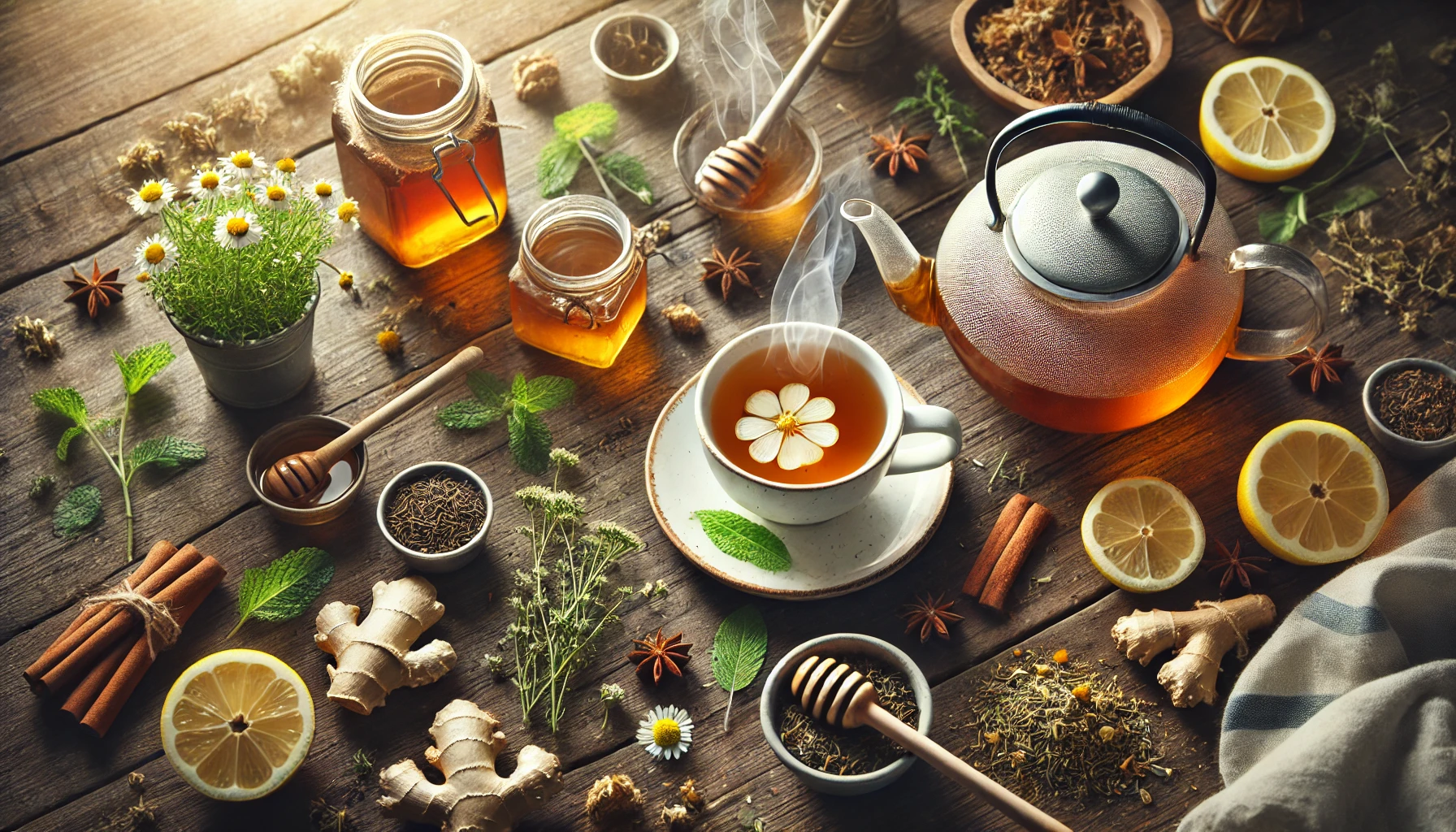
Even the most potent herbs can lose effectiveness if not brewed properly. Follow these best practices to ensure you get the full range of benefits from your herbal teas:
1. Use Fresh, High-Quality Herbs
- Choose organic, pesticide-free herbs whenever possible to avoid harmful chemicals.
- Store dried herbs in airtight containers away from heat and moisture to preserve potency.
- If using fresh herbs, wash them thoroughly before brewing.
2. Mind the Water Temperature
- Different herbs extract best at different temperatures:
- Delicate herbs (e.g., chamomile, lemon balm) – 180°F–190°F (82°C–88°C)
- Hardier herbs (e.g., ginger, echinacea, turmeric) – 200°F–212°F (93°C–100°C)
- Boiling water may degrade certain heat-sensitive compounds, so check individual recommendations.
3. Steeping Time Matters
- Over-steeping can make tea overly strong or bitter, while under-steeping might reduce potency.
- General steeping times:
- Soft herbs (chamomile, peppermint, hibiscus) – 5 to 10 minutes
- Roots and barks (ginger, turmeric, licorice root) – 10 to 15 minutes for full extraction
- Hard seeds (fennel, cardamom) – Crush before steeping for 15 minutes to release oils
4. Cover the Tea While Steeping
- Helps trap essential oils and beneficial compounds that might evaporate.
- Especially important for volatile oils found in peppermint, chamomile, and lemon balm.
5. Use the Right Brewing Method
- Hot Infusion – Best for soft leaves and flowers (steep in hot water for a few minutes).
- Decoction – Best for roots, barks, and seeds (simmer in water for at least 10–15 minutes).
- Cold Brew – Great for extracting delicate flavors and certain nutrients (steep in cold water for 6–12 hours).
6. Add Enhancers for Maximum Benefits
- Black Pepper – Increases absorption of curcumin in turmeric tea.
- Coconut Oil or Ghee – Helps extract fat-soluble compounds in herbs like turmeric.
- Honey or Lemon – Adds flavor and additional health benefits like antibacterial properties.
7. Experiment With Blends
- Mixing complementary herbs enhances both flavor and health benefits.
- Try:
- Ginger + Turmeric + Black Pepper for anti-inflammatory effects
- Chamomile + Lemon Balm for relaxation
- Peppermint + Echinacea for immune support
8. Strain Properly for Clarity
- Use a fine-mesh strainer or tea infuser to remove particles.
- Let sediment settle before pouring to avoid grit in the final cup.
By following these techniques, you can ensure that your herbal teas are flavorful, potent, and packed with health benefits.
Combining Herbal Teas for Synergistic Benefits
One of the best ways to maximize the efficacy of herbal teas is by combining multiple herbs to leverage their synergistic properties. Here are a few powerful combinations to consider:
1. Ginger + Turmeric + Black Pepper
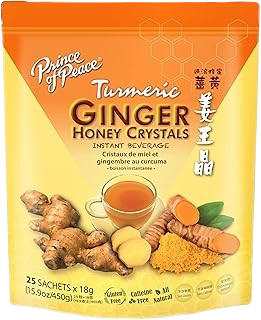
Why It Works:
- Ginger and turmeric have strong anti-inflammatory and antioxidant properties, helping to reduce pain and boost immunity.
- Black pepper enhances the absorption of curcumin, the active compound in turmeric, increasing its effectiveness.
Flavor Profile:
- Warm, earthy, and spicy.
- Add honey or lemon to balance the intensity.
2. Chamomile + Lemon Balm
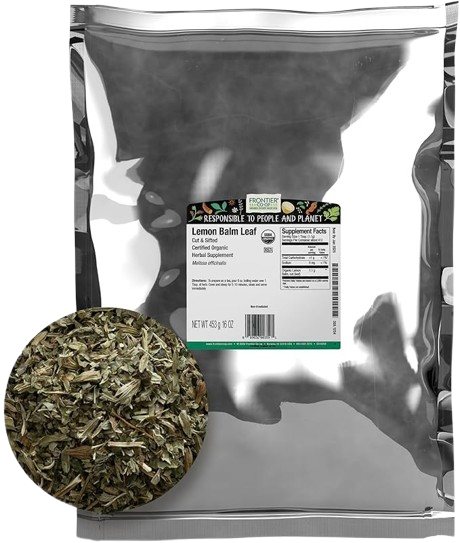
Why It Works:
- Both are calming herbs, perfect for reducing stress and anxiety.
- Promotes better sleep and relaxation, ideal for winding down at night.
Flavor Profile:
- Light, floral, and slightly citrusy.
- A gentle, soothing blend for evenings.
3. Peppermint + Echinacea
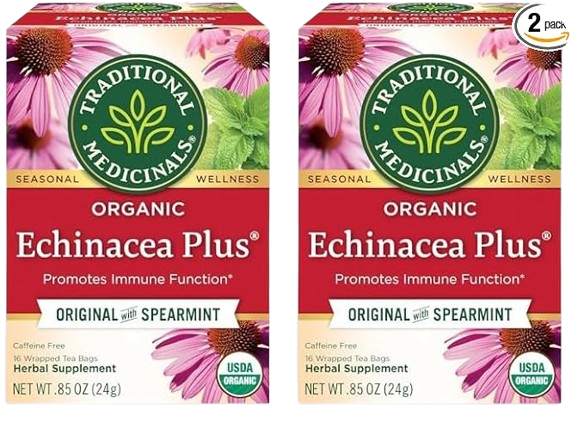
Why It Works:
- Peppermint helps clear sinuses and improve digestion.
- Echinacea boosts white blood cell activity, strengthening the immune response.
Flavor Profile:
- Cool, minty, and refreshing with a mild herbal undertone.
- Great for congestion relief and overall immune support.
4. Elderberry + Rosehip + Hibiscus
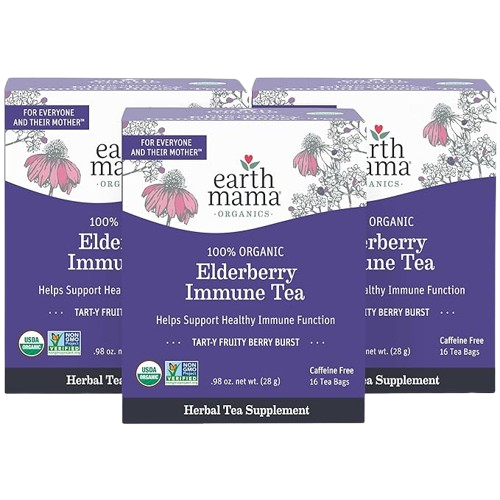
Why It Works:
- All three herbs are rich in antioxidants and vitamin C, making this blend a powerhouse for immunity.
- Supports respiratory health and helps fight off colds and flu.
Flavor Profile:
- Tart and fruity.
- Add honey or cinnamon for a sweeter taste.
5. Holy Basil (Tulsi) + Chamomile
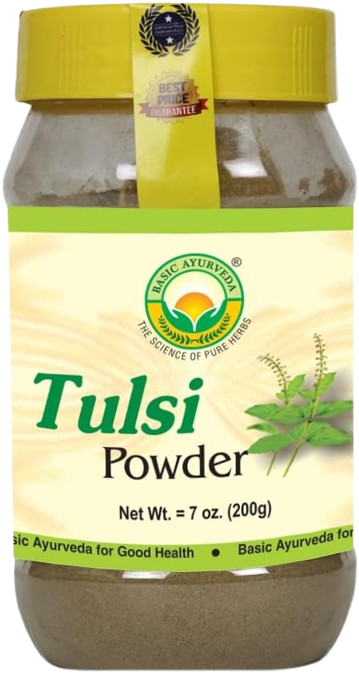
Why It Works:
- Tulsi (Holy Basil) is adaptogenic, helping the body manage stress and anxiety.
- Chamomile enhances relaxation and promotes calmness.
- Great for mental clarity, emotional balance, and immune health.
Flavor Profile:
- Mildly sweet and floral with a hint of spice.
- Can be enjoyed plain or with a dash of lemon and honey.
Tips for Blending Herbal Teas
- Start Small – Mix herbs in small quantities and adjust proportions based on taste and potency.
- Experiment with Additives – Try honey, lemon, cinnamon, or nutmeg to enhance flavors.
- Be Mindful of Contraindications – Some herbs may interact with medications or cause allergic reactions; consult a healthcare professional if unsure.
- Use Fresh or Dried Herbs – Fresh herbs provide a stronger flavor, while dried herbs offer convenience and longer shelf life.
When blending your teas, start with small portions of each herb and adjust proportions based on taste and desired potency. Always pay attention to any contraindications or side effects the herbs may have when combined.
Precautions, Side Effects, and Best Practices
While herbal teas are generally safe, it’s crucial to consider certain precautions to ensure you’re reaping benefits without unintended consequences:
- Allergic Reactions: Some individuals may be allergic to specific herbs. If you notice symptoms like rashes, itching, or trouble breathing, discontinue use and seek medical attention.
- Medication Interactions: Herbs like echinacea, turmeric, or chamomile can interact with prescription drugs (e.g., blood thinners, immunosuppressants). Always consult a healthcare professional before introducing herbal teas if you’re on medication.
- Pregnancy and Breastfeeding: Not all herbs are safe for pregnant or nursing mothers (e.g., high doses of ginger or turmeric). Check with a qualified professional to ensure safety.
- Underlying Health Conditions: Individuals with certain conditions like autoimmune disorders, thyroid issues, or kidney problems should be cautious. For instance, lemon balm may not be suitable for those with hypothyroidism.
- Moderation is Key: Drinking excessive amounts of certain herbal teas (like licorice root or senna, though not mentioned above) can lead to imbalances or side effects. Generally, 1–3 cups a day is safe for most herbs, but always listen to your body.
- Quality Control: Purchase herbs from reputable brands that conduct quality checks. Herbs can be contaminated with heavy metals or pesticides if not sourced properly.
Lifestyle Tips to Complement Herbal Tea Intake
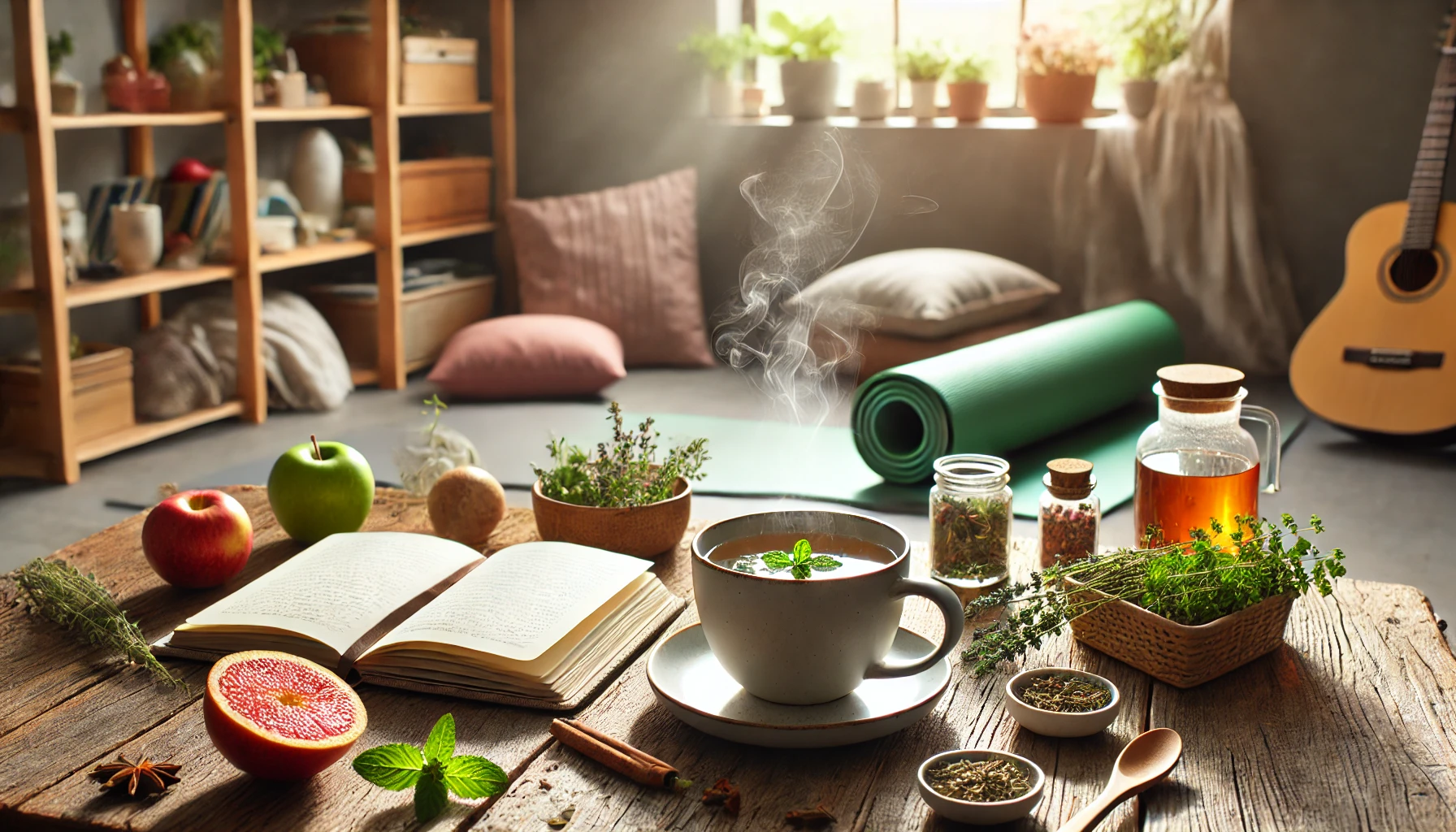
While herbal teas can be a valuable part of an immune-supportive regimen, they work best when combined with a holistic approach to health. Here are some actionable lifestyle tips:
- Balanced Nutrition
- Include a variety of fruits, vegetables, whole grains, and lean proteins in your diet.
- Incorporate immune-boosting nutrients like vitamin C, vitamin D, zinc, and selenium through diet or supplementation if needed.
- Adequate Hydration
- Drinking enough water supports all bodily functions, including immune defense.
- Herbal teas can contribute to your daily fluid intake, but be mindful of any herbs with diuretic effects (e.g., dandelion).
- Regular Exercise
- Moderate exercise (like brisk walking, yoga, or cycling) promotes blood circulation, which helps immune cells move more effectively throughout the body.
- Overtraining, however, can weaken the immune system, so balance is essential.
- Quality Sleep
- Aim for 7–9 hours of restful sleep each night.
- Herbal teas like chamomile and lemon balm can help facilitate better sleep.
- Stress Management
- Chronic stress can deplete your immune reserves. Activities like meditation, deep breathing exercises, or journaling can help keep stress in check.
- Adaptogenic herbs like holy basil may also help your body cope with stress.
- Limit Toxins and Alcohol
- Excessive alcohol intake and exposure to toxins (cigarette smoke, pollutants) can weaken immune function.
- Opt for a clean environment and reduce consumption of ultra-processed foods.
- Sunlight and Fresh Air
- Adequate vitamin D from sunlight exposure is crucial for a robust immune response.
- Spending time in nature can also reduce stress levels and improve overall well-being.
By combining immune-boosting herbal teas with these foundational health practices, you set the stage for a resilient, well-functioning immune system.
Conclusion: Building a Healthier Future With Herbal Teas
Herbal teas like ginger, chamomile, echinacea, elderberry, and many others have been cherished for generations as natural allies for immune support. They offer a potent blend of antioxidants, anti-inflammatory properties, and in some cases, adaptogenic benefits that help the body adapt to stress. When used mindfully and prepared correctly, these teas can become a cornerstone of your daily wellness routine.
Remember that no single herb or remedy can replace a balanced lifestyle. The best results come from a holistic approach—a nutrient-dense diet, regular exercise, adequate sleep, and effective stress management. Herbal teas serve as an accessible, enjoyable, and time-tested way to reinforce these lifestyle choices.
Here’s to sipping your way to better health—one warm, soothing cup at a time.
Final Thoughts & Key Takeaways
- Variety is Valuable: Incorporate different immune-supportive teas (ginger, chamomile, turmeric, etc.) for a spectrum of benefits.
- Mindful Brewing: Pay attention to water temperature, steeping times, and proper techniques to extract maximum potency from your herbs.
- Listen to Your Body: If you experience adverse effects or allergies, adjust accordingly and consult a healthcare provider.
- Holistic Health: Combine herbal teas with good nutrition, exercise, stress management, and adequate sleep for the strongest immune defense.
By integrating these practices, you not only enhance your immune system but also cultivate a lifestyle that fosters longevity and vibrant health. Cheers to a stronger, healthier you!
FAQ – Powerful Herbal Teas for Immunity
1. How do herbal teas support immunity?
- Rich in antioxidants, vitamins, and anti-inflammatory compounds.
- Help fight infections, reduce inflammation, and support overall wellness.
2. Which herbal tea is best for boosting immunity?
- Ginger Tea – Anti-inflammatory and antimicrobial.
- Chamomile Tea – Reduces stress, promotes sleep.
- Echinacea Tea – Enhances immune response.
- Turmeric Tea – Strong anti-inflammatory effects.
- Elderberry Tea – High in antioxidants and vitamin C.
3. Can I drink multiple herbal teas together?
- Yes! Combining teas can boost benefits.
- Example: Ginger + Turmeric for inflammation, Chamomile + Lemon Balm for relaxation.
4. How often should I drink herbal tea for immunity?
- 1–3 cups daily for regular immune support.
- 3–4 cups daily when feeling unwell.
5. Are there any side effects of herbal teas?
- Ginger – May cause stomach irritation in high doses.
- Echinacea – Not ideal for autoimmune conditions.
- Turmeric – Can interfere with blood thinners.
- Consult a doctor if on medication or have health conditions.
6. Can pregnant or breastfeeding women drink herbal teas?
- Safe: Chamomile, ginger, rooibos (in moderation).
- Avoid: Licorice root, echinacea, detox teas.
- Always consult a doctor first.
7. Is it better to drink herbal tea hot or cold?
- Hot – Soothes the throat and aids digestion.
- Cold – Refreshing and hydrating, same health benefits.
8. Can I add honey, lemon, or other ingredients to my herbal tea?
- Yes! Enhances flavor and benefits.
- Honey – Antibacterial, soothes throat.
- Lemon – High in vitamin C, boosts immunity.
- Black Pepper – Enhances turmeric absorption.
9. How long should I steep herbal tea for maximum benefits?
- Chamomile & Peppermint – 5–7 minutes.
- Ginger & Turmeric – 10–15 minutes.
- Echinacea & Elderberry – 10–15 minutes.
- Cover while steeping to retain essential oils.
10. Are store-bought tea bags as effective as loose-leaf tea?
- Loose-leaf tea – Higher quality, more nutrients.
- Tea bags – Convenient but may contain processed herbs.
- Choose organic, high-quality brands for better potency.

